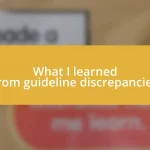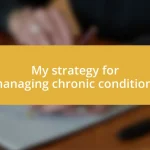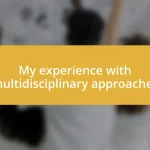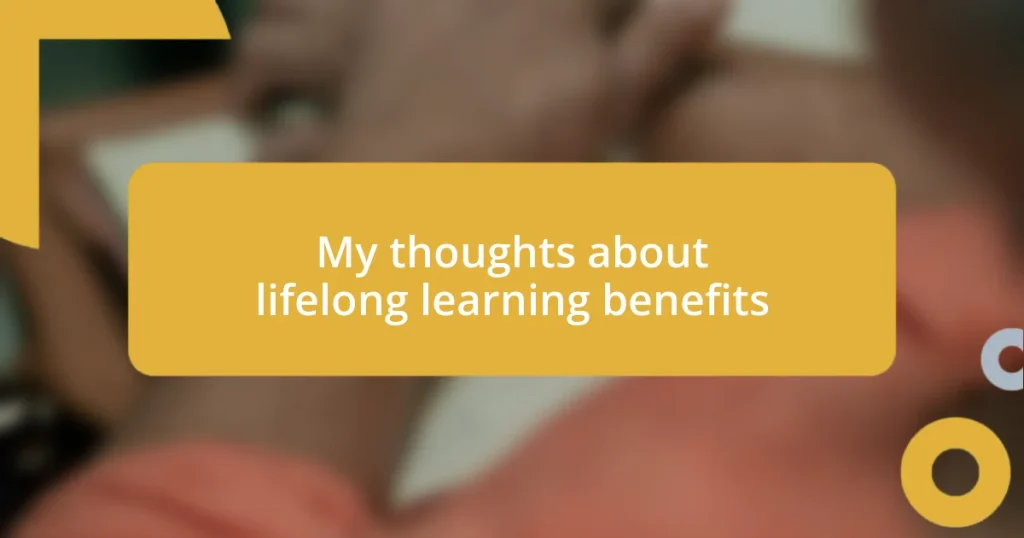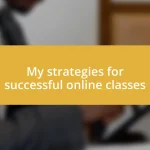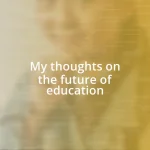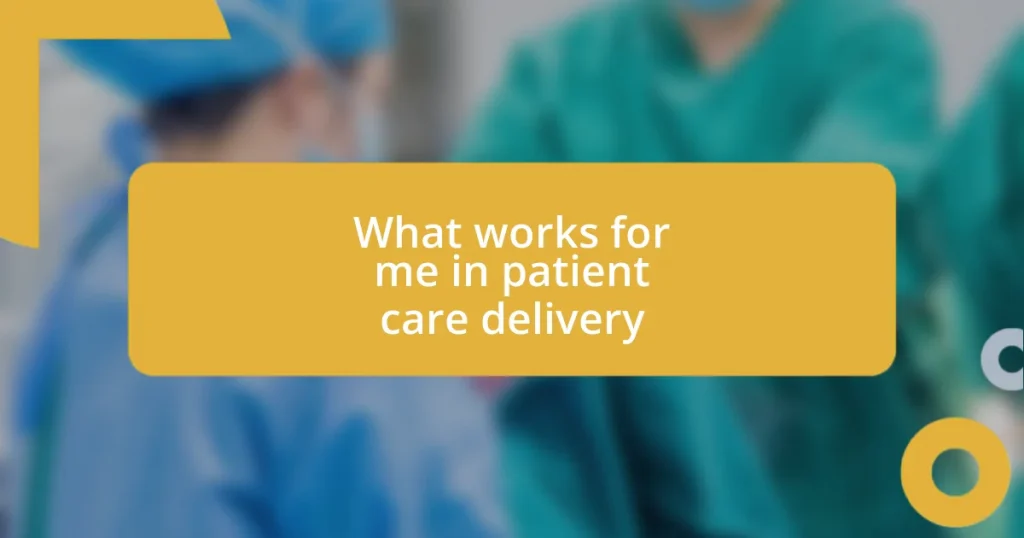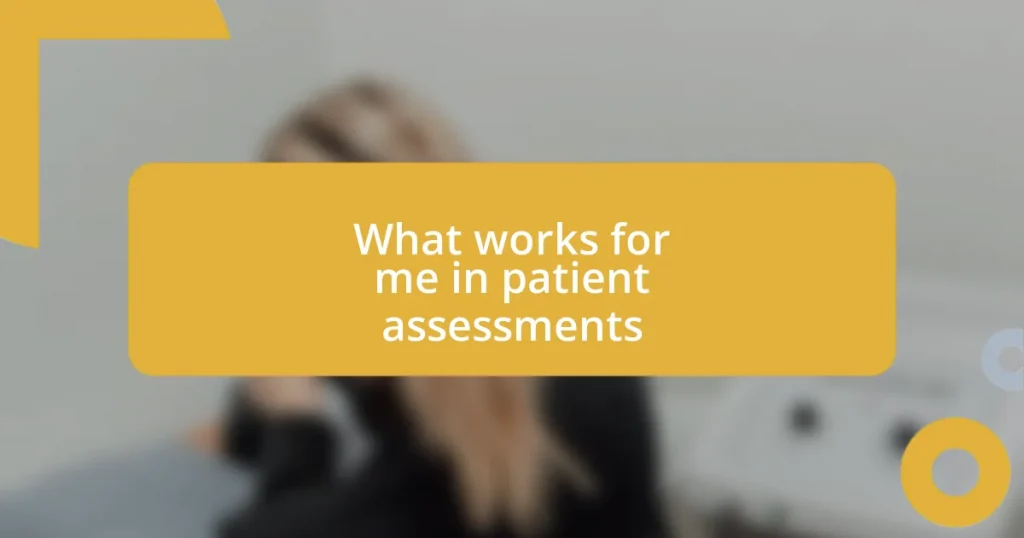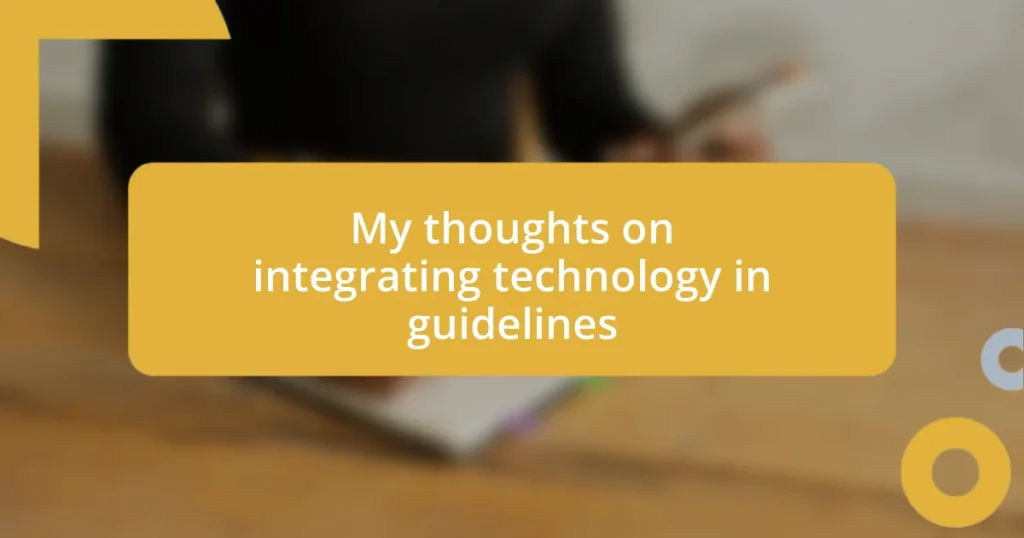Key takeaways:
- Lifelong learning enhances mental agility, fosters social connections, and builds confidence through diverse experiences.
- Continuous education is vital for personal and professional growth, offering adaptability, networking opportunities, and improved mental health.
- Effective lifelong learning strategies include setting achievable goals, establishing a consistent routine, and engaging with a community or mentor for support.

Understanding lifelong learning benefits
Lifelong learning benefits us in ways that often extend beyond the classroom. I remember when I took a cooking class as an adult—initially, it just felt like a fun activity. But what I didn’t anticipate was gaining confidence and creativity in the kitchen. It ignited a passion for culinary exploration that transformed family dinners into delightful experiences.
Think about how lifelong learning impacts our mental agility. Engaging with new concepts keeps our minds sharp, much like a workout keeps our bodies fit. I’ve noticed that when I read more widely or tackle unfamiliar subjects, I not only feel more fulfilled but also more equipped to navigate life’s challenges. Isn’t it empowering to feel that our minds can grow endlessly, no matter our age?
Moreover, the benefits of lifelong learning are remarkably social; building new skills often fosters connections. For instance, joining a local writing group not only improved my craft but also created a sense of community. Have you ever experienced that spark of camaraderie when sharing a passion with others? The friendships formed through lifelong learning can be incredibly enriching, reminding us that growth is a shared journey.

Importance of continuous education
Continuous education is crucial for personal and professional growth. It’s fascinating how acquiring new skills can shift our perspective, turning obstacles into opportunities. I remember when I delved into digital marketing. It was initially intimidating, but as I gradually mastered the concepts, my confidence soared. This newfound knowledge not only enhanced my career but ignited a passion for helping others grasp the complexities of the online world.
Here are some key benefits of continuous education:
- Adaptability: Learning helps us stay flexible in an ever-changing job market.
- Networking Opportunities: Engaging in educational activities often leads to meeting like-minded individuals and professionals.
- Mental Health: The challenge of learning can provide a sense of achievement and boost self-esteem.
- Diverse Perspectives: Exposure to various subjects broadens our worldview, enhancing empathy and understanding toward others.
- Career Advancement: Continuous learning opens doors for promotions and new job opportunities.

Personal growth through learning
Personal growth through learning can be a transformative journey. I remember when I decided to pursue a course in public speaking. Initially, I was terrified of presenting in front of others. However, with each session, I not only improved my ability to communicate effectively, but I also gained a newfound confidence that spilled over into other areas of my life. It’s incredible how learning something challenging can buffer your self-esteem and alter your self-image.
Additionally, exploring new subjects promotes introspection and self-awareness. When I took an online philosophy course, I found myself questioning my beliefs and values in ways I hadn’t before. It was like opening a door to deeper understanding of who I am and what drives me. Have you ever had a moment of revelation through learning? Those personal epiphanies can be eye-opening, leading us towards a more authentic version of ourselves.
The beauty of lifelong learning is in its ability to foster resilience. For instance, I recall feeling defeated when I struggled with a complex mathematics course. Instead of giving up, I persevered, and ultimately, that experience taught me the value of grit. Each challenge I face now feels less daunting, as I recognize that growth often comes from grappling with difficulties.
| Benefit | Example |
|---|---|
| Increased Confidence | Pursuing public speaking enhanced my communication skills and self-esteem. |
| Self-Awareness | A philosophy course led to a deeper understanding of my beliefs. |
| Resilience | Struggling with math taught me the value of perseverance. |

Professional advantages of lifelong learning
Lifelong learning can significantly enhance career prospects, as I’ve noticed firsthand. When I decided to take a data analysis course, it opened doors I hadn’t even considered. Suddenly, my resume became more attractive, and I found myself not just applying for positions but being selected for interviews that were previously out of reach. Isn’t it interesting how acquiring one new skill can elevate your professional standing?
Continuing education also cultivates a strong sense of adaptability. I vividly recall a time when my organization underwent a significant digital transformation. The new tools and technologies seemed overwhelming at first, but I took a course online to get acclimated. This proactive approach not only equipped me with the necessary skills but also allowed me to guide my colleagues through the transition. How often do we miss opportunities simply because we don’t adapt?
Moreover, engaging in ongoing learning fosters valuable networking opportunities. I made meaningful connections during a workshop about emerging industry trends that continue to benefit me today. Networking isn’t just about exchanging business cards; it’s about building relationships with like-minded individuals who can be pivotal in your career growth. Have you ever considered how such connections could elevate your professional journey?

Enhancing adaptability and resilience
When I think about the importance of adaptability, I can’t help but recall my shift into a management role. Initially, the responsibility felt overwhelming; I had to navigate team dynamics and shifting priorities. But as I embraced the new challenges, I began to realize that each hurdle was an opportunity to grow. This mindset not only helped me adapt but also enhance my resilience—after all, every setback became a lesson that strengthened my ability to handle future uncertainties.
There was a time when my project faced unexpected challenges due to a last-minute change in client requirements. Rather than panic, I took a step back and reassessed our approach, leading my team to brainstorm creative solutions together. The experience taught me that resilience isn’t just about enduring tough times; it’s also about creatively responding to change. I wonder, how often do we find ourselves in situations where adapting can turn a potential disaster into a triumph?
Through these experiences, I’ve learned that adaptability is rooted in the willingness to keep learning. The more I exposed myself to new ideas, techniques, and strategies, the more equipped I felt to face any situation head-on. I believe that lifelong learning sets the stage for incredible adaptability and resilience. Have you had experiences that pushed you to adapt? I’d love to hear how they shaped your perspective.

Strategies for effective lifelong learning
In my experience, one of the most effective strategies for lifelong learning is setting clear, achievable goals. I remember when I first wanted to learn a new programming language; I broke it down into manageable steps, targeting one concept at a time. This approach not only kept me motivated but also made the learning experience feel less daunting. Have you ever felt overwhelmed by the volume of information out there? I certainly have, and chunking it down made all the difference.
Another powerful tactic is to create a consistent learning routine. For instance, I dedicate at least 30 minutes each day to read articles or watch tutorials related to my field. This habit has transformed my knowledge base over time and helped me internalize new concepts. What about you? Do you have a routine that supports your learning, or are you still figuring it out? Establishing a personalized rhythm can lead to surprising progress.
Engaging with a community or finding a mentor can also accelerate your learning journey. I’ve greatly benefited from joining study groups where we discuss challenges and share insights. This interaction not only reinforces what I learn, but it also brings a sense of accountability. Have you considered how collaborating with others could enrich your learning experience? Harnessing the power of social learning has often pushed me to strive for deeper understanding and growth.




